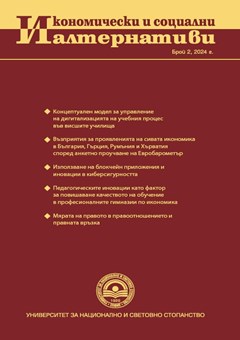Human Capital Research Program: Contemporary Bulgarian Projections
Author: Daniela Krasteva
Abstract
The research question discussed in the present article can be summarised as the recognition of theoretical and methodological solutions in the scientific service of the functioning of the modern Bulgarian labour market through the operating human capital research program. The analysis is close to its contemporary national projections, presented in terms of a positive result, negative scenarios and opportunities for socio-characteristic evaluation. This presupposes the need for a brief overview of the main aspects of capital formation, of basic concepts of human capital and of the foundation of related competence. Sustaining the function of human capital as a moderator (the ongoing creation and application of knowledge and skills-based behavioral construct) in the Republic of Bulgaria is presented with a view of the Lakatoska idea about the organisation the cognitive process through the creation and functioning of scientific research programs. Thus, the constructive power of the analysed capital is expressed not only in the created and productively realised competence resource, but also in the future benefit hidden behind the problematic areas of this process. These research expectations based on the Bulgarian environment define the guidelines for searching for the advancement of human capital studies as a modern paradigm of human resource management. The study is organised on the basis of the theoretical understanding of the main highlights of the Bulgarian research panorama of human capital in order to outline the results achieved and summarise existing challenges that science and practice face. An attempt is made to summarise the defining moments for the assessment of the sociofunctional nature (progression or degeneration) of the interpreted research programme.

